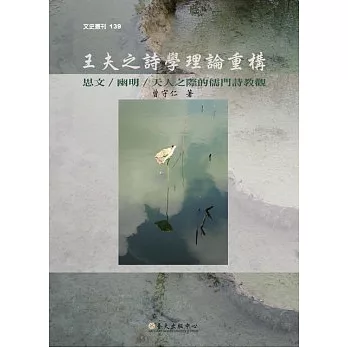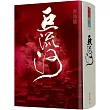詩歌發展至明清之際,原有的抒情性已然面貌不顯,淹沒於詩史、以文為詩等體類上的陵越;創作上則遭以意為主、敘事繁冗等的侵犯;當世小說、戲曲的風行,更使得強調簡、雅、凝鍊的詩歌一道受到強力挑戰,呈現出抒情與敘事的緊張性;在格律、詩法大行其道下,又使得詩人元聲、元氣拘滯而不能出,詩歌的真誠性受到質疑。
因此,船山倡言興觀群怨四者融通,經由情的收攝與轉進成為一心之洞燭與朗現,由人之情而得窺天之性;藉著抒情自我的靈視與觀照,那既是心性論上的延伸,同時也回應世運衰頹之所由,藉以辨明、超越晚明一片情論的差相彷彿。至此,遺民船山終能克服時間的天敵,其淒心熱魄得以安頓於(如白地光明錦)詩歌之中,將此孤忠丹心寄予後世,而那也是鼎革之後唯一的乾淨之土,讓自身超出了當代天崩地解。
英文提要
This dissertation aims to reconstruct the poetic theory of Wang Fu-chih. First of all, it discusses Wang’s misery poetry, from which the author also tries to review topics like “stimulating observing express fellowship show resentment”, “Fusion between emotion and scene”, “Theory of poetry and lyrics” and “concept and dynamic structure” to demonstrate that “affection” is the prerequisite of poetry. Furthermore, how Wang re-shapes the above-mentioned topics through “proper affections” and how he reflects poetry are also observed in the dissertation.
Poetry was not dominated by affection only when developed in Ming and Chin dynasties. At that time, it was overtaken by styles like “Shishi” and “Prose as poetry” . Concept was the dominant factor in composing poetry and narration and comment also appeared. Simplicity and elegance in poetry were severely challenged when novels became popular, and this also led to a conflict between affection and narration. Moreover, poets’ original voice was further refrained by principles and formats. Under this situation, poetry was no more a reflection of poets’ affection; rather, it became a writing style for poets to follow, and its simplicity was questioned.
Therefore, Wang believed that poetry lost its purity. He proclaimed the integration of “stimulating observing express fellowship show resentment”, and turned affection into insight and enlighten in the hope that human affection can observe the nature of the universe. His view about affections was different from other poets in the late Ming dynasty. He also believed that lyrics must be combined with poetry. In other words, lyrics should be the base for affection to further illuminate human emotion and poetry also needs to combine with morality to lead human beings to the original state of Grand Harmony where order and ethnics are still intact. Inspired by the combination of affection and lyrics, poets were able to reach the state of Grand harmony; poetry therefore served as a medium for their elevation and enlighten. “Concept is the dominant factor in poetry” proclaimed by Wang then demonstrated that a good concept is a process of thinking and reflection neither just a quotation of others’ works nor imagination.
Wang’s poetry theory actually is not an isolated territory. Judging from its consistency of thoughts, it is indeed the study of Heaven and Human Nature, also an extension of Theory of Human Nature. For folks living in the change of Ming and Chin dynasties, Wang’s affection-oriented poetry appropriately served as their response to the chaotic political environment. Wang could also attached his loyalty to Ming and found his redeem and a peaceful final settlement in his own poetry.
作者簡介
曾守仁
臺灣大學中國文學博士,現任輔仁大學中文系助理教授。主要研究領域包括宋、明、清詩學與文學理論。期刊、專書論文包含:竟陵派、錢謙益、王夫之研究論文數篇;《金聖嘆評點活動研究──擬結構主義的重構與解構》,暨南國際大學碩士論文,1998年,黃錦樹、高大威指導;《王夫之詩學理論重構:思文 / 幽明 / 天人之際的儒門詩教觀》,臺灣大學博士論文,2008年,鄭毓瑜指導。



 天天爆殺
天天爆殺  今日66折
今日66折 























 博客來
博客來 博客來
博客來 博客來
博客來 博客來
博客來 博客來
博客來